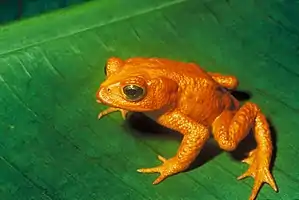Conservation-dependent species
A conservation-dependent species is a species which has been categorised as "Conservation Dependent" ("LR/cd") by the International Union for Conservation of Nature (IUCN), i.e. as dependent on conservation efforts to prevent it from becoming threatened with extinction. Such species must be the focus of a continuing species-specific and/or habitat-specific conservation programme, the cessation of which would result in the species qualifying for one of the threatened categories within a period of five years.
| Conservation status | |
|---|---|
 | |
| Extinct | |
| Threatened | |
| Lower Risk | |
Other categories | |
| |
Related topics
| |
 Comparison of Red list classes above and NatureServe status below  | |

The category is part of the IUCN 1994 Categories & Criteria (version 2.3), which is no longer used in evaluation of taxa, but persists in the IUCN Red List for taxa evaluated prior to 2001, when version 3.1 was first used. Using the 2001 (v3.1) system these taxa are classed as near threatened, but those that have not been re-evaluated remain with the "Conservation Dependent" category.
As of December 2015, there remains 209 conservation-dependent plant species and 29 conservation-dependent animal species.
Examples of conservation-dependent species include the black caiman (Melanosuchus niger), the sinarapan, the California ground cricket, and the flowering plant Garcinia hermonii.
Conservation-dependent animals
As of December 2015, the IUCN still lists 29 conservation-dependent animal species, and two conservation-dependent subpopulations or stocks.[1]
Fish
- Banded mountain zipper loach
- Ceylonese combtail
- Ornate paradisefish
- Sinarapan
- Two spot barb
- Black ruby barb
- Cherry barb
- Pearly rasbora
- Side-striped barb
Mammals
Subpopulations and stocks
- Bowhead whale (1 subpopulation/stock)
- Northern blue whale (1 subpopulation/stock)
EPBC Act
In Australia, the Environment Protection and Biodiversity Conservation Act 1999 still uses a "Conservation Dependent" category for classifying fauna and flora species. Species recognised as "Conservation Dependent" do not receive special protection, as they are not considered "matters of national environmental significance under the EPBC Act".
The legislation uses categories similar to those of the IUCN 1994 Categories & Criteria. It does not, however, have a near threatened category or any other "lower risk" categories.
As of December 2006, only two species have received the status under the act:
- Orange roughy (Hoplostethus atlanticus)
- Southern bent-wing bat (Miniopterus schreibersii bassanii)
No flora has been given the category under the EPBC Act.
See also
- Conservation-reliant species
- IUCN Red List conservation dependent species, ordered by taxonomic rank.
- Category:IUCN Red List conservation dependent species, ordered alphabetically.
References
- "IUCN Red List version 2015.4". The IUCN Red List of Threatened Species. International Union for Conservation of Nature and Natural Resources (IUCN). Retrieved 3 December 2015.



